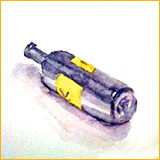| Mental Health Tips | |
| Common Mental Problems | |
| Substance Misuse | |
| Treatment of Mental Disorders | |
| Mental Health Education Pamphlets | |
 Alcoholism
Alcoholism
(Special thanks to Dr Ricky Tung of Institute of Mental Health, Castle Peak Hospital, for authoring this article)
Alcohol use is part of our daily life and reasonable consumption of alcohol is unlikely to cause major health problem. It is well known that drinking too much causes harm to our body; however, beyond the physical health hazard, it can also pose a threat to our psychological health.
1. How to drink safely?
2. What is the relationship between drinking and depression?
3. What are the features of problem drinking?
4. How can problem drinkers be helped by a specialized alcohol problem service?
5. Can any medication cures problem drinking?
1. How to drink safely?
Experts in the United Kingdoms recommend that an adult man should not take more than 21 units of alcohol in a week. As women are more susceptible to the harmful effect of alcohol, safety limit for female is set at 14 units per week. Despite the lower concentration of alcohol, beer and table wine, when being consumed in large quantity, can cause harm no less than that of stronger type of spirits.
Even if the weekly limit is not exceeded, drinking a large amount of alcohol in a short period of time (known as “binge drinking”) is dangerous, such as risk of sudden death, which is more common in middle-aged men. Therefore, for each occasion of drinking, consumption should be limited at 4 units for men and 3 units for women.
Daily drinking makes our body “getting used to” the effect of alcohol more easily, causing us to drink more and more to experience the same effect. And eventually we become dependent on alcohol. Therefore, there should be at least 2 drink-free days per week.
2. What is the relationship between drinking and depression?
Numerous researches have revealed the linkage between alcoholism and depression. Data in the United Kingdom showed that 40% of male suicide attempters had alcohol problem.
On one hand, excessive alcohol use leads to depressed mood. Alcohol inhibits the central nervous system, causing tiredness and sedation. Alcohol disturbs the balance of certain important chemicals in brain, increasing the risks of mood disorder. Heavy drinking brings health problems, dispirited life, family disharmony and financial difficulty into our lives, which all could lead to immense psychological stress and eventual depression.
On the other hand, when a person is depressed, he might use alcohol to relieve the sorrow; however, as time goes by, it tends to make him even more depressed. Drinking can help us stop thinking about the troubles for a while, giving a few hours of consoling to those who are upset. However, habitual drinking as a way to cope with difficulties in life, will soon lead to escalating use of alcohol and subsequent dependence. All those problems in life will not simply go away with drinking, instead they get worse and make us even more depressed.
Most people with alcohol problem and depression will begin to improve a few weeks after they stop drinking. They will have a sound mind and better spirit to try solving the difficulties in life, relationship with others will improve. These changes will substantially uplift the mood.
3. What are the features of problem drinking?
The following features indicate possible problem drinking:
- Drinks every day in a regular manner; alcohol drinking becomes an integral part of life, like feeding and going to toilet.
- Think about drinking whenever you feel sad.
- When you sober up, you often forget about what happened before you got drunk.
- Once you start to drink, you fail to control how much you drink and stop only when you are heavily drunk.
- Become “tolerant” to alcohol effect and need to drink more and more to get tipsy.
- Drink soon after getting up in morning to avoid any discomfort or to soothe your nerve.
- People around you wish you to drink less, but you just cannot do that.
4. How can problem drinkers be helped by a specialized alcohol problem service?
Problem drinkers are usually reluctant to seek help for a number of reasons, such as shame, fear of being blamed, failing to understand alcohol dependence as an illness or feeling pessimistic or even hopeless on their alcohol problem. In fact, there is effective treatment which can bring improvement to their problems.
Mental health professionals will work as a team. They will assess the current alcohol use, look for any dependence features, related psychiatric or physical problems. The person will be guided to understand better about their drinking problem. Psychiatrist will manage the psychiatric problems, and refer to other medical specialties for management of physical problems when appropriate. The person and treatment team will come to an agreed treatment goal, which can be “controlled drinking” or total abstinence.
Customized counseling will help the person to reduce drinking gradually in order to achieve the goal. For those whose dependence is more severe or having complicated problems, a short period of in-patient treatment can be considered, following by further medication and rehabilitation service to prevent resumption of drinking.
5. Can any medication cures problem drinking?
Some over-the-counter preparations claim in commercial media that they are effective in protecting the liver against alcohol. In fact there is no robust medical evidence on their claimed effect. To the disappointment of many people, so far there is no medicine that can easily get rid of problem drinking.
Nonetheless, medications have an important role in helping problem drinkers. There are medications which can relieve the discomfort after stopping drinking. Vitamin supplements are useful for alcohol-related vitamin deficiency. There are medications that can help to mitigate the psychological craving for alcohol.
Medication is just part of a comprehensive treatment package, other components like psychological treatment and counseling are essential for successful treatment of problem drinking.
Websites with relevant information / Reference
東華三院「遠酒高飛」酗酒治療計劃|
================================================================================ Thank you for browsing the mental health tips on the IMH internet. We would like to hear feedback from you through the questionnaire below. Your comments are most welcome for our continuous improvement. |
No. of visitors of this page: 2602


